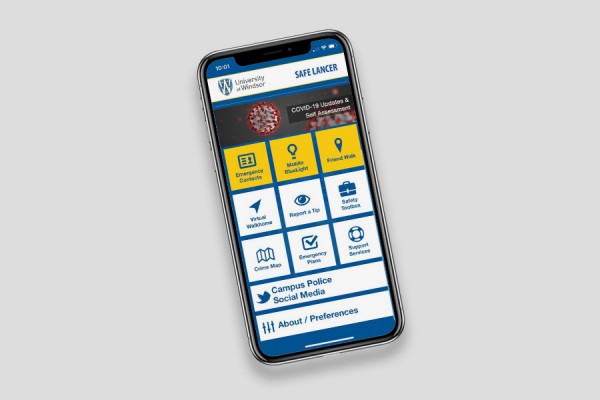 UWindsor has unveiled a new feature on its Safe Lancer app that allows students, staff, and faculty to assess their health each day.
UWindsor has unveiled a new feature on its Safe Lancer app that allows students, staff, and faculty to assess their health each day.
When it comes to keeping University of Windsor students and employees safe from COVID-19, there’s an app for that.
UWindsor has unveiled a new feature on its Safe Lancer app that allows students, staff, and faculty to do a quick daily health assessment on themselves by answering a few yes or no questions on their mobile devices. Instead of filling out paper questionnaires about symptoms, travel, or potential exposure to the virus, anyone on campus can simply hold up their device to show they’ve completed the assessment.
The app is one of the ways UWindsor is protecting the wellbeing of everyone on campus, said Jennie Atkins, who heads the working groups overseeing gradual return to campus initiatives.
Another includes deploying a team of nursing students across campus to do health screenings, encourage people to wear masks, and practise social distancing, and offer information about how to protect yourself from contracting the virus.
“We are framing all decisions and planning around the best ways to put the health and safety of our entire campus community first,” Atkins said.
The university has spent $1.7 million in new technology and support for online learning.
Nearly all classes will be offered online. The only exceptions are some labs and clinical courses deemed safe for in-person instruction. About 175 students will have in-person classes and 100 more will be working in research labs.
Before heading to campus, for faculty, staff, and students will be required to attend an online session to keep them informed of what they need to know.
The Leddy Library is closed to in-person visits, but materials are available online. Both the library and bookstore are offering curbside pickup.
“Even though the majority of the learning this semester will be virtual, we have put in place supports to ensure students continue to get high-quality learning opportunities,” said provost Douglas Kneale.
Faculty members have turned for help to the online learning experts in UWindsor’s Office of Open Learning and the Centre for Teaching and Learning, as well as mentors within faculties. There’s an army of students acting as peer mentors, too.
“We have great esprit de corps across campus, virtually and actually,” Dr. Kneale said. “Bon courage to everyone as we launch into the fall semester.”
Every building on campus has been analyzed to ensure social distancing and proper traffic flow. New signage directs people though hallways, elevators, and other spaces on campus. Cleaning staff are using hospital-grade disinfectants. Heating and cooling systems have new, upgraded filters, and maintenance staff have them set to take in maximum fresh air.
Everyone on campus will get masks the University selected and purchased after UWindsor researchers used a scanning electron microscope to analyze a slate of prototypes.
Masks are included in the welcome packages handed to the 210 students who will be living in residence this semester. Other items in the package include hand sanitizer, disinfectant wipes, snacks, and UWindsor swag.
The students will be moving in this weekend between the hours of 9 a.m. and 5 p.m. Saturday and Sunday. While up to two students may share a common living space, every student will have his or her own bedroom this semester. Residence assistants are trained in looking for signs of social isolation, said Ryan Flannagan, associate vice-president, student experience.
Welcome Week events for all students will include online activities.
“The team responsible for Welcome Week went all-out over the summer to move our orientation program online this year,” Flannagan said.
“The chief priorities for our program this year are fun, accessibility, building connections, and, of course, safety. We think the incoming students are going to have a busy and memorable first week even though most of our students won’t be on campus.”
UWindsor is committed to a gradual, safe return to campus. For more information, visit the return to campus website.
—Sarah Sacheli
